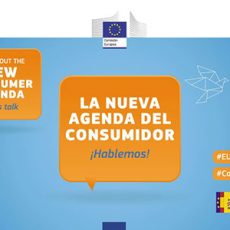
November 20 is World Children’s Day. To mark the date, as in other years, the European Association for Digital Transition (EADT) held a discussion session in Madrid on the digital rights of minors. New in 2024 is that the event arose from an agreement between the European Association for Digital Transition and the public business institution Red.es, within the framework of the Digital Rights observation area and aimed at promoting the Digital Rights Charter.
After welcoming remarks from María Andrés, director of the European Parliament Liaison Office in Spain, which hosted the event, Ricardo Rodríguez Contreras, President of the EADT, spoke. Rodríguez noted that in recent years “society as a whole, families and states have begun to take steps to protect children on the platforms”.
In this regard, he stressed the importance of the proposal for a state pact to protect minors on the Internet, an initiative promoted by the EADT in 2023 along with five other social entities: Dale una Vuelta, Fundación ANAR, iCMedia, Save the Children and Unicef España.
This initiative had an impact in the political sphere with creation, by the Ministry of Youth and Children, of an expert working group in digitalisation and minors to improve the entire political and administrative response to situations such as cyberbullying, the commodification of minors’ data, or mental health problems that social networks can cause in minors.
But, as the EADT president emphasized, it is not just a matter of legislation. All kinds of measures are needed, and especially “those that affect the large online platforms. We demand more transparency, more responsibility and more accountability from them. They’ve dragged their feet on the EU Digital Services Act, and we need to go further. We have to demand they accept their ethical, civil and criminal responsibility”.
Ana Caballero, vice-president of the EADT and president of the group of experts created by the Ministry of Youth, stressed in her speech that full responsibility for the problems related to digitalisation of minors should not be placed on parents and the educational community. “In these years of work we have been able to create a social consensus on the need to act on these problems, which has shifted to the political sphere”, she said. At the same time, she recalled that the business model of the large Internet platforms does not distinguish between adults and minors, and “Article 32 of the Convention on the Rights of the Child emphasizes the right of the child to be protected from economic exploitation”.
Moreover, economist Javier Santacruz pointed out the “serious problem” of the absence of putting an explicit value on the data that minors share on platforms: “It is not true the Internet is free. There’s no monetary exchange, but there is a hidden value in the data”. Santacruz himself carried out research in 2021, which is pending updating, that put the average annual value of each user’s data at 81.61 euros per social network.
Experts from different fields
Santacruz was one of the experts, from different fields, who participated in the conference, along with Rosa Díaz, director of the Observatorio Nacional de Tecnología y Sociedad (ONTSI), who presented the initiatives to implement the Digital Rights Charter; Luisa González, president of the Fundación del Colegio Médico de Madrid; Alex Romero, founder and CEO of the cybersecurity and cybernetic intelligence company Alto Intelligence; Leonardo Cervera, general secretary of the European Data Protection Supervisor; Encarna Cuenca, president of the Consejo Escolar del Estado; María José Olesti, general director of The Family Watch; and Miguel Ángel Delgado, director of the IES Antonio Machado in Soria, one of the Spanish regions where education centres show the highest performance, according to results from the PISA report and from the EBAU (university selection exams) in Castilla y León.
A key issue, the prevention and fight against sexual exploitation online, was addressed by José García Serrano, head of the Brigada Central de Investigación Tecnológica of the National Police; Daniel Moreno Gómez, a lieutenant with the Civil Guard, Unidad Técnica de Policía Judicial; and Antonio Labrador, the European Commission’s team leader on the fight against child sexual abuse in the Directorate General of Migration and Home Affairs of the European Commission.
EU legislation, and what the European Parliament can move forward on in this newly initiated parliamentary term, was addressed in online remarks by two representatives from the majority groups in the European Parliament: Pablo Arias of the European People’s Party and Laura Ballarín of the Progressive Alliance of Socialists and Democrats.
Both speakers emphasised the importance of the Digital Services Act but also recognised the need to be firm with the Internet platforms regarding its complex implementation. “We can’t make the same mistakes we made in the past, when we didn’t pay close enough attention to digital issues; we can’t leave something in the hands of private companies that is radically influencing our lives”, Arias said. “In the European Parliament, the big groups disagree on many questions, but there is consensus here; we cannot afford to lose an entire generation”, commented Ballarín.




